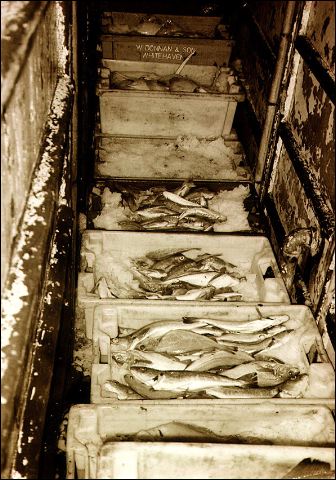The Sardine Question and Aquculture Crisis - a familiar ring to the tone and content despite being translated by machine (Google Translate).
"The economic importance of marine fisheries is enormous. Their performance is all the more precious that so far there was no need to sow to reap, and that, in the words of Franklin, this is an income that gives us all free Nature. This way of life will last indefintiely? The plaintive echoes which, on all sides, we announce a gradual depopulation are likely to make us fear that this will not always be so, though there is no unanimity on this point and that many scientists believe simple movement of fauna under different influences, natural or even due to human action. Anyway, the current crisis seems to give a sardine greater likelihood of the pessimistic assessments.
But, 1888, a new Order withdrew that permission. The progressive course of improvement of instruments capture was stopped by the fact of legal impediments, under the influence of fear special ri va nt of economic ideas of those concerned, and this by the advice of a commission consisting predominantly by fishermen. They have forgotten that prior to use of a remote contingency, it must first live and that therefore it is necessary to follow Example neighbors and develop ways to capture.
Fears that can arise regarding fishing methods too advanced are twofold: economic and theoretical, aimed at a possible depopulation. There can certainly be considered as quite chimerical to fear that overfishing has to result of lowering the current price. But the evil and feared would be more or less overcome by increasing the total production, it might even be more or less avoided some regulatory restrictions. French products sell for a little better than their like strangers. However, the introduction of these the market is nonetheless one. great discomfort by comparison with the time when our Britons had a monopoly Production of sardine cans. Past, poor fisheries were compensated quite natural in raising the price of the commodity sold. Today it do not be the same, because the presence of products. Foreign maintains the variation in prices within narrow limits. From these considerations, it appears that it seems essential our fishermen to upgrade their ptocédés capture both want to fight against foreign competition.
Fishing seasons ollrent changes most diverse, or they have a uniform
remarkable or are confused by their irregularity. Abnormal phenomena can occur during periods of emergence, under the influence of causes still unknown, but which, a priori, seem clearly correspond either to changes in temperature water or weather-General, who start moving waters of the North Atlantic or Finally, a phenomena that alter the water regime Coastal.
Thus England do not send us that 1.5 million kg, and that retransmits only province in about 5 Ojo receipts. Boulogne it is most important to our ports fishing. He sent to Paris in about 7,000,000 kg. Peas::-olls, consisting mainly of mackerel, herring, whiting, conger, mullet, skate, gurnard and quail. There as though in smaller proportions, turbot, sole
and channel catfish. A spirit of bold initiative characterized this port.
Its fleet consists of thirty trawlers steam and double large sailboats, including. Crew is a score of men. These boats will seek mackerel off the coast of Ireland, or herring high in North Sea, from the end of June, for the following tinue to the coasts of France, where he arrived in October and where the fishery for about another two months. Many of these navir'es also engage in fishing trawl year mainly to take flatfish, turbot, sole, rays, dabs, plaice, brill, but also red mullet, hake, etc..
The sailboats, themselves, are equipped with a steam winch to bring on board the trawlers, as well as for hauling nets used for fishing for herring and mackerel nets can reach a length of several kilometers.
Besides the above vessels, the fleet includes Bolognese number of trawlers still more pelites, for practice herring fishing using nets, within sight of land, and that of skate and conger using very long cables trimmed hooks. Last year, two steam trawlers Bolognese went in Icelandic waters and have reported a cargo of about thirty thousand francs of cod.
CONCLUSIONS
Of all the foregoing considerations, we will the following conclusions:
1 It is urgent to consider an overhaul of rational regulations;
2 There would be restricting the right to fish I sardine drift component benches ds breeding. This restriction would be easy to apply, since it does not appear at the same time as the sardine roe;
3 It seems essential to allow, encourage similarly, on the coast of France, the use of sophisticated equipment for catching sardines spawn. A transitional measure useful could be the adoption of the net Guézennec;
4 He also seems rational to consider a substitution plan final vapours, with appropriate regulations to current boats;
5 It would be highly desirable to establish a monitoring effective marine fisheries;
6 should facilitate the creation of a laboratory biological studies of marine animals in order to achieve complete knowledge of their habits and conditions reproduction, and lead to the creation of institution hatchery capable of replacing, as and when, In salt water, as was done for the soft, voids disastrous results from the fishing more intensively.
7 It would be useful to convene a meeting of a Commission International competent, responsible for studying the drawbacks of trawling for shrimp trawling and steaming, 'limit' trawling zones, and regulations develop a rational, potentially, effective supervision, safeguard the heritage of the fishermen in the interest of food and trawlers themselves."

















































